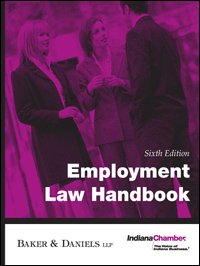 A federal judge in Texas last week struck down an Obama-era federal rule on overtime pay that would have added to the regulatory burden and increased the salary threshold for overtime-eligible workers – thus increasing employers’ labor costs.
A federal judge in Texas last week struck down an Obama-era federal rule on overtime pay that would have added to the regulatory burden and increased the salary threshold for overtime-eligible workers – thus increasing employers’ labor costs.
The rule would have made about 4 million people eligible for overtime that were not previously eligible and would have impacted the “white collar exemption” of the Fair Labor Standards Act.
Mike Ripley, Indiana Chamber vice president of health care and employment law policy, pointed to the overreach of the previous administration’s Department of Labor (DOL) rule and that the judge’s decision makes way for more reasonable agreement and discussion between employers and the DOL.
U.S. Chamber of Commerce President and CEO Thomas J. Donohue released this statement about the judge’s decision:
“(The) decision is another victory for the effort to free our economy from the regulatory stranglehold of the last eight years. We have consistently said that the last administration went too far in its 2016 overtime rule, and we are pleased that Judge Mazzant granted a final judgment that makes permanent his previous ruling against the overtime rule.
“This means that small businesses, nonprofits, and other employers throughout the economy can be certain that the 2016 salary threshold will not result in significant new labor costs and cause many disruptions in how work gets done. The Obama administration’s rule would have resulted in salaried professional employees being converted to hourly wages, reduced workplace flexibility and remote electronic access to work, and halted opportunities for career advancement.
“We look forward to working with the Department of Labor on a new rule to develop a more appropriate update to the salary threshold.”
A coalition of national and local business groups challenged the rule in 2016 and the Indiana Attorney General’s office filed on behalf of the state of Indiana.
The Department of Justice this week dropped an appeal to save the rule after the judge’s decision.

 We’re all still recalibrating after last Tuesday’s election results. While the citizenry ponders what this means for the country and the issues dear to us, the impact on labor and employment policy is a top consideration for business-focused organizations like ours.
We’re all still recalibrating after last Tuesday’s election results. While the citizenry ponders what this means for the country and the issues dear to us, the impact on labor and employment policy is a top consideration for business-focused organizations like ours. Much has changed in Unemployment Compensation legislation since our last edition of the Unemployment Compensation Handbook was released in 2007. In just this past year alone, both state and federal lawmakers have impacted Indiana’s Unemployment Compensation system with the American Recovery and Reinvestment Act of 2009, as well as Indiana House Bill 1379, which addressed the depleted UI Trust Fund and launched both increased tax rates and stricter eligibility rules for unemployed workers applying for UI benefits; and in 2010, Senate Bill 23, which delayed the tax increases on Indiana employers for one year.
Much has changed in Unemployment Compensation legislation since our last edition of the Unemployment Compensation Handbook was released in 2007. In just this past year alone, both state and federal lawmakers have impacted Indiana’s Unemployment Compensation system with the American Recovery and Reinvestment Act of 2009, as well as Indiana House Bill 1379, which addressed the depleted UI Trust Fund and launched both increased tax rates and stricter eligibility rules for unemployed workers applying for UI benefits; and in 2010, Senate Bill 23, which delayed the tax increases on Indiana employers for one year. Customers spoke — and we listened.
Customers spoke — and we listened..jpg) I got an e-mail Monday afternoon about an event starting the next day that would continue throughout the rest of the week. It was referred to as a “massive poster shipping party.” These four words didn’t really seem to go together, but I was pleased to be invited nonetheless.
I got an e-mail Monday afternoon about an event starting the next day that would continue throughout the rest of the week. It was referred to as a “massive poster shipping party.” These four words didn’t really seem to go together, but I was pleased to be invited nonetheless.